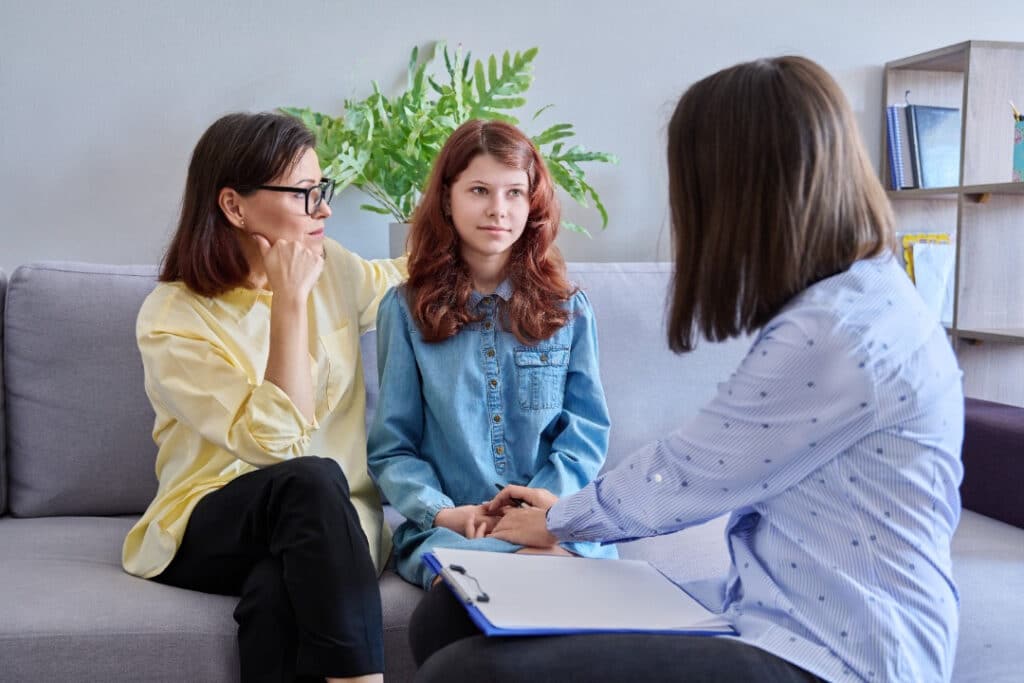Eating disorders are complex psychiatric illnesses with severe medical and psychological consequences, and the challenges don’t end there. Eating disorders affect every aspect of your life, including relationships with loved ones. The strain eating disorders have on relationships can be destructive to families. This article will discuss how family support programs can aid in recovery, as having your loved ones by your side is an important part of your healing..
How Can Family Support Programs Aid Individuals in Recovery?
Family dynamics play a huge role in recovering and healing from eating disorders. Unfortunately, those dynamics may not always be positive and can sometimes hinder recovery. This situation is when family support programs can help. Family support programs provide caregivers with crucial tools to positively impact their loved one’s eating disorder recovery.
Bridge the Misunderstanding Gap
Eating disorders are hugely misunderstood, which causes much frustration among caregivers and significant pain and isolation among individuals suffering from the condition. Families and caregivers often come from a place of love and concern, but they don’t always know how to provide the support their loved ones need. Effectively supporting someone is often a learned skill. Family support programs can bridge this gap of misunderstanding by offering education, empathy, and encouragement to all parties involved.
Freedom from Isolation
Let’s face it; sometimes, we want isolation, but it’s not always beneficial. Recovery is not something to do alone; an environment of understanding, acceptance, and open conversation is essential for successful recovery. This process requires support and serious commitment from those around you. Family support programs can help families and caregivers navigate challenging behaviors that you may be prone to so they can maintain a supportive environment and a positive presence in your life.
Take Your Recovery Home
Recovering from an eating disorder doesn’t end when the formal treatment program ends. Individuals continue to work on their recovery daily, and the journey can last a lifetime. This commitment means recovery will continue in your home, where your support system surrounds you. You and your loved ones must know how to continue practicing what you learned in treatment and how to function in your day-to-day environment. This step is most successful when your family participates in your treatment and care. (1)
Types of Family Support Programs Available for Eating Disorder Recovery
Families who have been through the complex process of managing an eating disorder have found that various forms of support are helpful. Involvement with and support from treatment teams and informal sources like support groups and online forums is vital to helping families have a positive experience as caregivers. (2)
- Family-based treatment: This therapy aims to restore nutrition with direct participation and support from families. A treatment team of trained professionals assists and guides caregivers through the process.
- Support groups: These groups provide a forum for people to share their personal experiences, allowing for connections with others who are going through similar struggles.
- Online resources: Searching for reputable organizations like the National Eating Disorders Association (NEDA) or National Alliance on Mental Illness (NAMI) gives families access to a wealth of educational materials and literature on living with an eating disorder and the recovery process. (3)
Benefits of Participating in a Family Support Program
Caregivers of individuals suffering from eating disorders experience a great deal of stress and psychological burden. Family support programs provide a safe and therapeutic environment for families to learn new coping mechanisms, manage stress, and improve relationships, all while helping the person suffering from the eating disorder.
Support programs can also help caregivers identify triggers that may lead to harmful behaviors and develop strategies and boundaries to avoid them. Families can learn how to improve communication and interactions with each other and develop skills that will help individuals cope with the challenges of living with an eating disorder.
What if I Don’t Have a Close Relationship With My Family?
A painful reality for many is a negative family relationship or lack of support or family presence. Yet, family comes in different forms; sometimes, our friends or mentors are our families. Family support programs are open to individuals who are important to you and can commit to being a part of your support system and recovery. Treatment teams understand that there are many family structures outside of the traditional and will work to include the people you care about and connect you with others who can support you to have the most positive impact on your treatment and recovery.
Undeniably, family and caregivers have a crucial role in eating disorder recovery. Toledo Center offers parents and caregivers a comprehensive Family Education and Coaching Program. Call Toledo Center at 419-885-8800 or fill out the contact form to find the right treatment program for you or your loved one.
Resources
- Sheldon-Dean, H. (2023, February 8). Family-based treatment for eating disorders. Child Mind Institute. https://childmind.org/article/family-based-treatment-for-eating-disorders/
- Rienecke, R.D. (2017). Family-based treatment of eating disorders in adolescents: current insights. Adolescent Health, Medicine and Therapeutics, 8, 69-79. doi: 10.2147/AHMT.S115775
- National Eating Disorders Association (NEDA). (n.d.) Parent toolkit. https://www.nationaleatingdisorders.org/parent-toolkit
Author Bio:
Kate Delaney Chen, BSN, RN-BC is a healthcare writer and registered nurse with over 17 years of bedside experience. She specializes in Psychiatric Nursing and Nephrology and currently works at a nationally recognized inpatient Eating Disorders Program.

